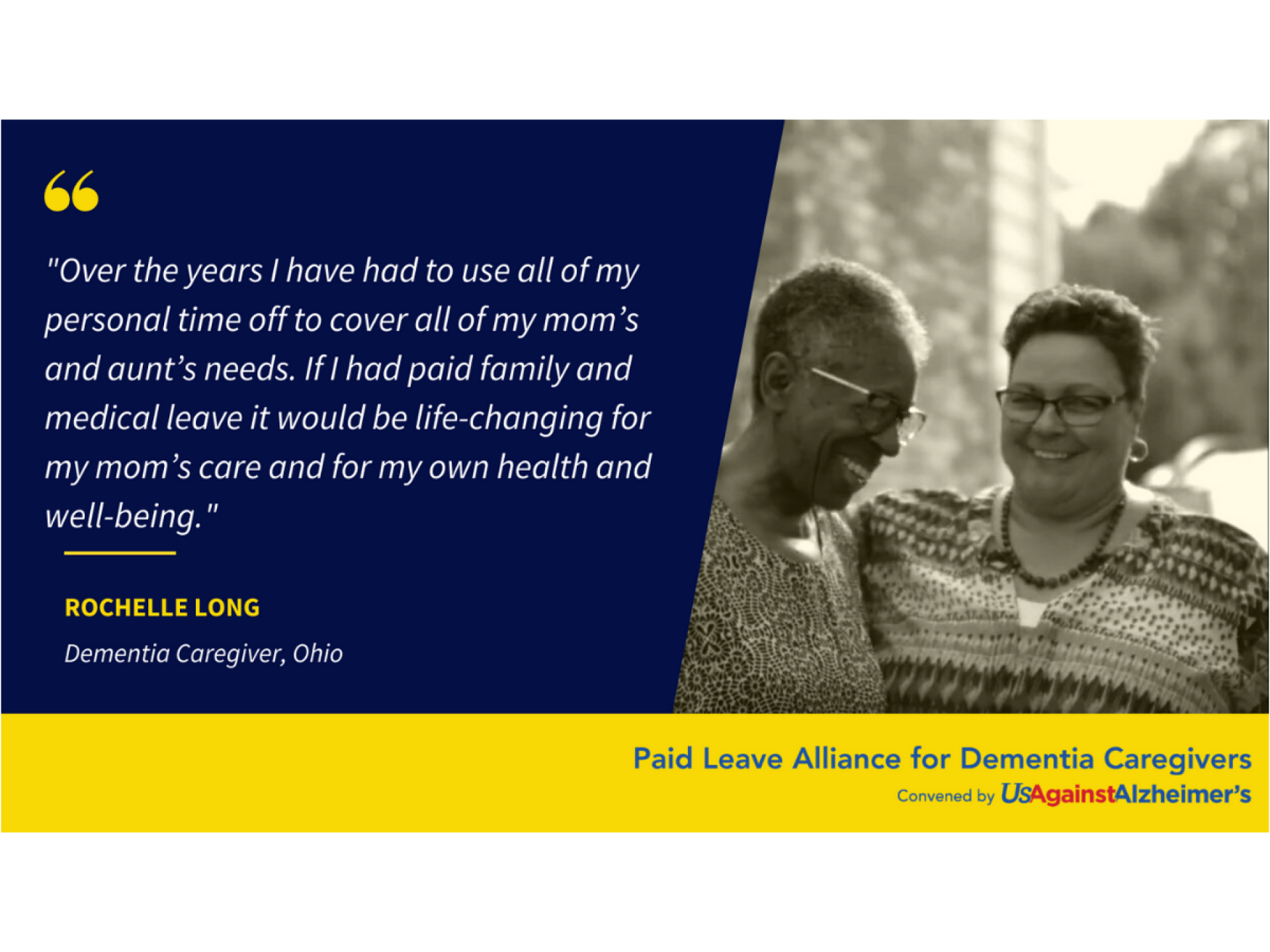Paid Family Leave Can Build Health and Economic Equity

Sign up and receive information on the latest news and updates.
The US is woefully unprepared to care for the growing population of older adults, and we rely too heavily on the unpaid help of family and friends. All while trying to hold down a job. An estimated 29.2 million Americans are employed while caring for an aging family member. On average, they work the equivalent of a full-time job (35.7 hours a week) while providing about 24 hours of care each week. Our country’s continued reliance on unpaid caregivers is neither sustainable nor equitable, especially for caregivers of people living with dementia.
It is not sustainable because the impossible balance of complex care tasks, work, and financial stress causes many family caregivers to struggle with burnout, presenteeism, and retirement savings. The Federal Family and Medical Leave Act (FMLA) only guarantees unpaid leave to 60 percent of the current American workforce. Consequently, employed caregivers do not take FMLA leave—even when they need to take time off to care for family members—because they cannot afford it. Fewer than half of employed dementia caregivers report having access to paid and flexible family leave options.
It is not equitable because women of color suffer the most from the combination of these disparities and challenges. In December 2020, the US economy lost 140,000 in net job losses; 156,000 of the jobs lost were held by women of color, while men gained 16,000. Black and Latina women disproportionately work in some of the hardest hit sectors of the pandemic, and are less likely to have access to flexible hours, paid leave, and the ability to work from home. African American and Latina caregivers are more likely to be working full time while balancing caregiving responsibilities. Because women provide 2/3 of unpaid care, they are more likely to experience workforce interruptions, leading to lost benefits and promotions at work. A recent survey by the Bipartisan Policy Center found that 16 percent of Latino and 13 percent of Black adults have left the workforce to provide care for an adult family member during the pandemic. When a woman reaches retirement age, she may have earned a cumulative $1,055,000 less than a man who has stayed continuously in the workforce.
The lack of universal paid family leave adversely affects our society’s health, progress towards equity, and workforce strength. Both of us have close relatives who lived with dementia for many years. We are privileged to have jobs that provide paid leave, enabling us to take them to doctor’s appointments and COVID-19 vaccinations, help with personal hygiene, and make sure they were well fed. This is not the reality for most working Americans – especially those with hourly-paid jobs.
The Milken Institute Alliance to Improve Dementia Care — a broad coalition of over 70 members from industry, government, philanthropy, research, advocacy, community-based organizations, and health systems — supports bipartisan federal and state efforts to expand paid family leave for eldercare, explained in our recent report on how to build health equity for African Americans and Latinos. We believe this is a vital step toward health and economic equity, and without it, women and people of color may be forced out of the workforce to care for their families.
Some progress has been made with nine states and DC recently enacting laws that guarantee paid leave for employees who must care for a family member with a serious health condition. Evidence from these government-sponsored programs demonstrates that paid family leave programs are affordable and sustainable. A US Department of Labor analysis of California’s program found that the paid leave programs have positively impacted productivity, profitability, and performance. California workers were also more likely to return to their jobs after taking paid leave, helping with retention. Implementing paid family leave in California was also linked to an 11 percent relative decline in elderly nursing home usage. Business leaders have also begun to move forward in supporting their employees through strong paid leave policies, in addition to advocating for a comprehensive national policy.
Less than one-half of employed dementia caregivers report having access to paid leave benefits, although those who can utilize paid leave benefits report improved health and emotional well-being. That's why the Milken Institute's Center for the Future of Aging joined the Paid Leave Alliance for Dementia Caregivers, convened by UsAgainstAlzheimer's. As part of this multi-sector coalition, we are promoting the passage of a federal paid family and medical leave policy that covers care across the lifespan, from care for a newborn baby to care for an older loved one.
We need a federal policy so that this critical support is available to all Americans. Dementia care is placing tremendous pressure on our moms, daughters, and sisters. The House Ways and Means Committee held a hearing on paid leave on April 21. President Biden just put forward the American Families Plan, which calls for the creation of a national paid family and medical leave program. We urge swift action. The US is the only developed country that doesn't provide paid leave to its citizens, and the White House notes that this is one of the key reason that the US has fallen behind our economic competitors in the number of women participating in the labor force
Without the ability to take paid leave, too many Americans are faced with an impossible choice. If you are forced to choose between taking care of your mother or your job, you will choose your mom. Paid family leave gives every American a better opportunity to find a balance between work and caregiving.
